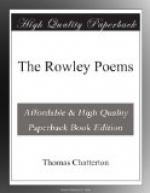[Footnote 34: ceased, dead, no more.]
[Footnote 35: lament.]
[Footnote 36: a manner of asking a favour.]
[Footnote 37: turn.]
[Footnote 38: carefully, with circumspection.]
[Footnote 39: dry, sun-burnt.]
[Footnote 40: valley.]
[Footnote 41: a song, or ballad.]
[Footnote 42: withered.]
[Footnote 43: arisen, or arose.]
[Footnote 44: blossomed.]
[Footnote 45: disdainfully.]
[Footnote 46: disdained.]
[Footnote 47: glory.]
[Footnote 48: quickly.]
[Footnote 49: burnt.]
[Footnote 50: such.]
[Footnote 51: lord’s.]
[Footnote 52: a purse or bag.]
[Footnote 53: slay.]
[Footnote 54: ease.]
[Footnote 55: truth.]
[Footnote 56: happy.]
[Footnote 57: workest.]
[Footnote 58: the hidden or secret part of.]
[Footnote 59: souls.]
[Footnote 60: full soon, or presently.]
[Footnote 61: car.]
[Footnote 62: two.]
[Footnote 63: a bottle.]
[Footnote 64: a country dance, still practised in the North.]
[Footnote 65: baffle.]
[Footnote 66: a corruption of feints.]
[Footnote 67: a minstrel is a musician.]
[Footnote 68: unbounded.]
[Footnote 69: branches.]
[Footnote 70: furious.]
[Footnote 71: tempests, storms.]
[Footnote 72: dire.]
[Footnote 73: dismay.]
[Footnote 74: dwarf.]
[Footnote 75: humility.]
[Footnote 76: decked.]
[Footnote 77: unhurt.]
[Footnote 78: picture.]
[Footnote 79: tempest-beaten.]
ELINOURE AND JUGA.
Onne Ruddeborne[1] bank twa
pynynge Maydens fate,
Theire teares faste dryppeynge
to the waterre cleere;
Echone bementynge[2] for her
absente mate,
Who atte Seyncte Albonns shouke
the morthynge[3] speare.
The nottebrowne Elinoure to
Juga fayre 5
Dydde speke acroole[4], wythe
languishment of eyne,
Lyche droppes of pearlie dew, lemed[5]
the quyvryng brine.
ELINOURE.
O gentle Juga! heare mie dernie[6]
plainte,
To fyghte for Yorke mie love
ys dyghte[7] in stele;
O maie ne sanguen steine the
whyte rose peyncte, 10
Maie good Seyncte Cuthberte
watche Syrre Roberte wele.
Moke moe thanne deathe in
phantasie I feele;
See! see! upon the grounde
he bleedynge lies;
Inhild[8] some joice[9] of lyfe or else
mie deare love dies.
JUGA.




